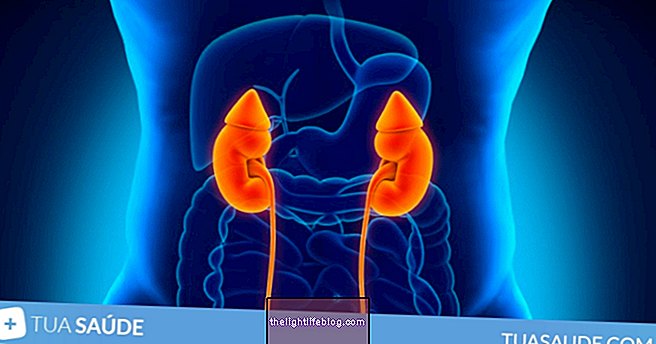The presence of mucus in the urine is usually normal. However, when there is an increase in the release of mucus in the urine may be indicative of more serious problems such as urinary tract infections, ulcerative colitis or even bladder cancer.
The presence of mucus usually leaves the urine looking cloudy. In the normal urine examination, mucoid filaments or wires may be seen, but when the presence of several epithelial cells, the presence of bacteria, cylinders, crystals or numerous pyocytes, can be considered, it is recommended to go to the doctor to investigate the cause and start treatment. See how the urine test is done.
The treatment varies according to the cause of mucus release, ranging from food changes, to the use of antibiotics and the need for surgery.

1. Pregnancy
It is common for the pregnant to notice the presence of mucus in the urine, because during pregnancy it is common for the body to release some nutrients and minerals, which leaves the urine with a cloudy appearance. In addition, it is common to increase the volume of mucus produced near the end of pregnancy.
What to do: The presence of mucus in pregnancy is normal, but if the woman finds that the volume of mucus is too large and has some characteristic symptom of a urinary tract infection, for example, she should go to the gynecologist.
2. Urinary tract infections
Excessive mucus production usually indicates a urinary tract infection, which can be a cystitis, which is bladder infection, a urethritis, urethral infection, or pyelonephritis, which is the infection in the kidneys.
In urinary tract infections urine tests will usually indicate the presence of numerous bacteria, mucus, various epithelial cells, and numerous pyocytes. In addition to these features seen through urinalysis, the person may still experience pain or burning when urinating.
What to do: As soon as you notice turbidity and the presence of mucus in the urine, you should go to the urologist or gynecologist, in the case of women. Treatment is usually done with antibiotics such as amoxicillin or ciprofloxacin.
3. Sexually transmitted diseases
Some sexually transmitted diseases cause excessive mucus production, such as gonorrhea and chlamydia. Symptoms of these diseases are similar to those of urinary tract infection, such as pain or burning when urinating, abdominal discomfort, pain during intimate contact, bleeding between menstrual periods, and presence of white or yellow discharge in women, and in men there may be inflammation of the skin of the penis and swelling of the testicles. See more about Chlamydia and Gonorrhea.
What to do: When the first symptoms occur, you should go to the urologist or gynecologist, in the case of women, so that you can have a correct diagnosis of the disease. The treatment is done with the use of antibiotics, such as azithromycin and ceftriaxone, to eliminate the bacteria. In addition, antibiotic treatment with the sexual partners and use of a condom should be performed.

4. Ulcerative colitis
Ulcerative colitis is a disease characterized by the presence of wounds on the wall in the intestine. In this way there is alteration in the mucosa of the intestine, which leads to the abnormal production of mucus, that can be released in the urine, mainly in women. Learn more about ulcerative colitis.
What to do: When the mucus in the urine occurs in association with diarrhea, abdominal pain, fever and weight loss, one should go to the gastroenterologist because it may be an ulcerative colitis.
The treatment, most of the time, is done with the use of dietary supplements and change in diet, being recommended the intake of foods rich in fibers. The doctor may also indicate some medicine that can stop diarrhea, such as loperamide.
5. Irritable bowel syndrome
Irritable bowel syndrome can also lead to the presence of mucus in the urine because it is an inflammation of the intestinal villi, which are structures located in the mucosa in the intestine that are responsible for the absorption of nutrients. The presence of mucus in the urine from the irritable bowel syndrome is more common in women because the vaginal and anal secretions are able to mix, which makes the woman more prone to infections.
Thus, irritable bowel syndrome can lead to the production of thick mucus, in addition to causing symptoms such as pain, excess gas and constipation or diarrhea. See the symptoms of irritable bowel syndrome.
What to do: You are advised to go to the gastroenterologist for a diagnosis and start treatment. Usually irritable bowel syndrome is treated with a change in diet, but if the symptoms are very strong and persistent, the doctor may indicate the use of some laxative or antibiotic. See how the treatment of irritable bowel syndrome is done.

6. Bladder cancer
Urine mucus may also be indicative of bladder cancer, but this is not very common. To be indicative of bladder cancer, the mucus should be accompanied by blood, abdominal pain, weight loss and appetite, and increased need to urinate.
What to do: When a person identifies these symptoms, it is best to seek medical advice quickly, because depending on the stage of the tumor, the treatment indicated by the doctor is different. Learn how to identify and treat bladder cancer.
7. Kidney stone
In the case of kidney stones, the urinary system starts to produce more mucus in an attempt to eliminate the stone and unclog the system. The presence of mucus in the urine is a sign of kidney stone when the urine presents cloudy appearance, dark yellow color, besides strong and unpleasant smell. Here are the symptoms of kidney stone.
What to do: As soon as the first kidney stone symptoms are felt, such as frequent urination, pain in the lumbar and urination, it is important to go to the urologist. The treatment varies according to the size of the stone. If it is too large, surgery is indicated. Otherwise, the doctor usually asks the patient to drink plenty of water so that he can expel the stone in the urine. Depending on the degree of pain experienced by the patient, the urologist may indicate some analgesic to relieve the pain.
When to go to the doctor
It is important to go to the doctor when you notice a large volume of mucus being released into the urine and when in addition to this mucus you will experience pain when urinating, low back pain, dark and foul-smelling urine, swelling of the genitals or discharge in the case of women.
It is important to pay attention to the aspects of the urine, as even dehydration can be perceived from your observation. See for common urine changes.

























